- Home
- Paul Christopher
The Templar conspiracy t-4 Page 10
The Templar conspiracy t-4 Read online
Page 10
He went to the head of the stairs and listened. From somewhere he could hear a TV blaring, a news program by the sound of it, and kitchen noises. There was the sudden gassy hiss of a soda can being popped open and then footsteps, the squeak of springs and finally a sonorous belch. The TV channel switched. A game show in French and then a sitcom in German. Happy Days, judging from the music. Somebody was working a remote.
Holliday headed barefoot down the stairs, keeping to the wall, the HK held in two hands at gut level. Eight rounds in the magazine. If he needed more than that he was in serious trouble. He reached the bottom of the stairs and another short hallway. An archway on his left led into a brightly lit kitchen. To the right he could see the jumping shadows of the TV show on the far wall of the living room. He took a step to his right and a floorboard creaked.
"Heinrich? Ist ihm hellwach sein?"
"Ja," said Holliday, unable to come up with something more original. He took a turning step into the living room. In front of him was a leather couch. The man seated on the couch half turned his head. At the sight of Holliday with a gun in his hand the man's eyes widened and he struggled to get up and haul his weapon from its shoulder holster. On the big plasma screen, the Fonz was flirting shyly in German with Mrs. Cunningham.
Holliday shot him in the right shoulder. The silenced pistol made a sound like somebody bursting a paper bag. The man screamed. Holliday fired again, this time shattering the right elbow, the bullet exiting in a blur of blood and tissue, finally hitting Henry Winkler right in his leather jacket. The plasma-screen image blurred, then dissolved like melting candle wax. A can of Fanta grape soda dropped from the man's hand and he sagged back onto the couch, moaning. No one else appeared. Leaving the wounded man where he was, Holliday checked the kitchen and the dining room. No one. He turned his attention back to the wounded man.
"Konnen Sie Englisch?" Holliday asked.
The bleeding man shook his head, his teeth clenched. "Only a little." He was about the same size as poor, dead Heinrich upstairs, but his face was pocked and scarred by the memory of a bad case of adolescent acne.
"There was a young woman and a priest. Ein Pfarrer."
"Ja."
"Where are they?"
The man gave him a hard scowl and sneered.
"Mach es dir Selber, Mutterficker."
That wasn't hard to figure out. He shot the man in the left kneecap.
"Wo sind Sie?" Holliday asked a second time. The man was turning pasty white, the blood literally draining out of his face. The man was silent. The holstered gun at his shoulder was an MP5. The man could see it but with his useless arm he couldn't get at it. The little machine pistol could have turned Holliday into hamburger. Holliday shot him in the right ankle. "Der Pfarrer und der Fraulien. Wo sind sie?"
"Die anderen Haus," screeched the man on the couch. The other house.
"Was andere Haus?"
"Die Strasse."
"Vas?"
"Aussensite! Die Berg Strasse." The mountain road outside.
"Nach oben, oder unten?"
"Oben!" grunted the man. Up the mountain road. Another house.
"Wie viele Wachen?" How many guards?
The man said nothing. He stared up at Holliday, sweat beading on his forehead. The man gave his best imitation of a resolute scowl again. A name, rank and serial number type of guy. Holliday didn't believe it for a second. The wounded man was beginning to shake as the pain took over. Another few seconds and he was going to pass out.
"Wie viele Wachen?" Holliday repeated. He put the muzzle of the suppressor against the man's left eye and pushed a little.
"Drei! Drei Wachen!" Three guards.
Holliday slid the MP5 out of the man's shoulder holster and took a step back. The man was slipping into unconsciousness but there was no telling how long he'd stay there. His eyes rolled up and his head slumped to one side. He clearly needed medical attention and it was obvious he'd be out for a good, long time. On the other hand, he'd seen a soldier with his legs blown off at the knees trying to crawl his bloody way across a rice paddy to an evac chopper.
"I'm sorry," said Holliday, meaning it. He put the suppressor an inch from the man's ear and pulled the trigger. He jerked a little as the paper bag popped. Holliday slid the HK into his pants and put on his shoes. He picked up the machine pistol and wondered about the effort involved in taking the shoulder holster from the dead man.
There was a faint, familiar sound behind him. Outside? Feet coming up the steps? He turned as the door opened, the MP5 in his right hand. He thumbed off the safety.
A man in a dark blue ski jacket closed the door behind him, then turned and stood in the foyer, a quizzical expression on his face. "You're not Heinrich." His right hand went behind his back.
"You're right, I'm not," said Holliday. He squeezed the trigger on the machine pistol, center mass. There was a sound like someone ripping a piece of heavy cloth and the man went down. Holliday went to the body, his finger on the trigger just in case, but the man had half a dozen holes in his chest and one in his throat. Holliday teased the man over with the toe of his shoe, then dug around a little.
He found a Para Slim Hawg.45 in a waistband holster and a passport and wallet in the man's buttoned back pocket. The passport was a brand-new diplomatic with the embedded microchip, and it identified the owner as Major John Boyd Hale, assistant military attache to the embassy in Rome. Holliday had enough military experience to know his name might be John Boyd Hale or it might not be. He might or might not really be a major, as well, and he was or possibly wasn't really an assistant military attache. Considering Major Hale's appearance at this particular door, it was more likely that he was CIA and his job here was to interrogate Holliday. On the other hand, considering Matoon's presence at the vineyard, the dead man in the foyer could also be Defense Intelligence Agency, or even be tied into Kate Sinclair's oddball construct, the Jihad al-Salibiyya. He shook his head. Since the so-called Jihadists had taken credit for the Pope's assassination no one had made the Templar connection, or if they had, they'd ignored it. As far as the media was concerned, the people's interest ended at the word "Jihad." Eventually some scholar would come forward but by then it would be too late. The president would be dead.
Or maybe not. If he could get them out of this there was still a chance. He stepped over the body of Major John Boyd Hale and opened the door. He cautiously moved out onto the wide porch of the chalet. It was fully dark now but he could make out the enormous, deeper blackness of the mountain on his left and the paler line of the road ahead. There was a black, late-model Volkswagen Phaeton and an older-model Mercedes parked in front of the chalet, but he ignored both vehicles; he wasn't about to announce his arrival.
He began to climb.
Brennan had been slouched against the wall facing the door for the last hour and a half, singing the same song over and over in a whispered, grating soprano. It was beginning to get on Peggy's nerves. Apparently it was called "The Orange and the Green." Oh, it is the biggest mix-up that you have never seen. My father, he was orange, and me mother, she was green…
"Quiet; they're talking again," said Peggy, her ear to the door. "Yelling actually."
Brennan stopped singing and stumbled to his feet, his tied hands making it difficult. He made his way to the door and leaned toward it, pressing his ear against the wood panel.
"What are they talking about?" Peggy said.
"Someone called Heinrich; they've been trying to call him but he doesn't answer. They think something's wrong."
Peggy smiled. "I told you so."
"You think it's your uncle?"
"'Wrong' is his middle name. Heinrich is not in the best of health right now, I guarantee it," said Peggy. She eased away from the door and let herself slowly slide down the wall.
"You sound pretty sure of yourself," said Brennan.
"I've been with Doc in situations like this before; I know what I'm talking about."
"Once a soldier, always
a soldier?" Brennan said.
"Put it this way: he's not the kind who simply fades away." She listened to the men arguing on the other side of the door. "I'd get as low as possible," suggested Peggy. "There's going to be bullets flying any minute now."
The priest lowered himself toward the floor.
It wasn't minutes; it was seconds. There was the sound of breaking glass and then a heavy thud. Two voices began screaming in Italian. More glass broke and then there was silence. Peggy could hear the men whispering. "Get over here," she hissed at Brennan. The priest crawled across the room on elbows and knees. "What are they saying?" Peggy demanded.
"One of them was shot and killed. The other two are figuring out what to do."
"Which is?"
The priest listened and then translated. "'Vittorio, go to the window and see where he is.' 'Feck you, Mario,' or words to that effect. 'Go see for yourself.' " Brennan paused. There was more panicky conversation.
"Now what?"
"Vittorio wants to kill us and try to get away. Mario is telling him he's an idiot." There was a pause. "Mario wants to use us as human shields."
"I don't much like the sound of that," said Peggy.
"There's not much we can do about it," said Brennan.
"We'll see about that. Give me your shoes."
"I beg your pardon?"
"Your shoes damn it! Hurry!"
Brennan untied his shoes and slipped them off. They were heavy black brogues that would have suited a cop. Peggy picked one up and threw it at the little window in the back wall. The old glass smashed loudly and the shoe disappeared into the night. Peggy yelled at the top of her lungs.
"Doc! There's two of them! We're in a room at the back!"
Both Peggy and Brennan clearly heard the raised voices outside the door.
"Mario! Chiuso loro in su!" Shut them up.
"Figlio di Puttana!"
There was the sound of pounding feet.
"He's coming in!"
Which was just what Peggy wanted. As the door opened she launched herself forward at a dead run, hurling herself at the doorway like a charging bull, head-butting the man named Vittorio in the groin and sending him flying backward to collide with Mario, who was standing in the middle of a small living-dining area.
They went down in a tumbled heap of arms and legs, and Mario's weapon went flying across the hardwood floor. Mario managed to throw off Peggy and crab walk his way across the floor toward the weapon while Peggy turned her attention toward Vittorio, who was screaming and holding his ankle, which was now twisted at a grotesque angle.
Peggy went for Vittorio's eyes, hooking her index fingers into his ears and her thumbs into the eye sockets just like Doc had taught her. She pressed hard and the razor-thin edges of her nails punctured both eyeballs, covering Peggy's hands in a rush of warm fluid and changing Vittorio's scream into a screech of terrified agony as he suddenly went blind.
Out of the corner of her eye Peggy saw Mario reach his pistol and turn it toward her. Off to her left the front door opened and Mario swung the weapon toward the new threat. Holding the pistol two-handed he pulled the trigger, but it was too late. Holliday came into the room in a low roll, stitching an entire clip of fifteen 10mm bullets in Mario's direction. Mario's shots had gone high. Holliday's were low, almost cutting the kneeling man in half. Peggy head-butting Mario to the gruesome blinding of Vittorio and Mario's execution had taken no more than thirty seconds. The room was full of the hot-sharp smell of gunfire and Vittorio's screaming. Peggy clambered to her feet.
"Honey, I'm home!" Holliday grinned from the doorway.
Peggy stumbled toward him. "That's the worst Ricky Ricardo I've ever heard." She threw herself into his arms, then burst into sobs.
Brennan came out of the back room, frowning. "Now, which one of you is going to fetch me my other shoe?"
16
Lieutenant John Charles Fremont sat at the communications center in the basement of the Pentagon, scrolling through that day's orders from the Joint Chiefs. The particular bunker he and a dozen other men and women occupied was officially known as a Crisis Control Operations Center, and on this particular midnight-to-eight shift he was the designated communications watch officer. In other words, in Pentagon-speak he was the DC-CWO of the JCS CCOC. Unofficially, he was King Rat of the Big Cheese Rat Hole. Sergeant Knox Bellingham, the man seated beside him, was a senior console operator, more simply known as a Big Rat.
"You been noticing a lot of traffic for something called Prairie Fire?" Lieutenant Fremont said.
"Yes, sir," said Bellingham. "I've got personnel tickets for a whole bunch of people en route to Colorado Springs, Houston, and Sunnyvale, California."
"You notice anything weird, Sergeant?"
"Yes, sir," answered Bellingham, squinting at the screen in front of him. "They're all O-one to O-six. And they're all SOCOM."
Fremont sat back in his chair and looked at the screen pulsing in front of him. All of them on duty were officers, from lieutenant to lieutenant colonel, and all were part of the Special Operations Command. Colorado Springs was NORAD and the Consolidated Space Operations Center, Houston was NASA and Sunnyvale was the Air Force Satellite Test Center. Put them together and you had the complete command-and-control capabilities for every military communications satellite in the sky.
"What's the transit coding on the orders?" Fremont asked.
"USTRANSCOM." Bellingham responded, checking the file on his screen. That made sense, sort of. USTRANSCOM stood for United States Transport Command.
"Subcoding?"
"DCS/AMC."
That made sense, too-Defense Courier Service, Airborne Military Command, the people who transferred sensitive material from one place to the other.
"What about the unit budget line?" Every individual unit within a larger command had its own designation for defense budgeting purposes. It was where the buck stopped, literally.
"STRATCOMCON."
"Never heard of it," Fremont said, frowning. In Pentagon-speak STRATCOMCON probably stood for Strategic Communications Control, and Prairie Fire was probably some kind of operation it was running. Given the number of officers being shifted around, it was going to wind up costing the taxpayers a load of dollars. He made a query note about it in the computer log and then forgot all about it. The weekend was coming up and he was going hiking with his girlfriend in Cunningham Falls State Park in the Catoctin Mountains. One more night of being cooped up in the bunker and he'd be out in the fresh air. He couldn't wait.
"So, what do we do now?" Brennan asked from the backseat of the big VW luxury car. They were heading south just beyond Les Contamines, ninety minutes away from the Geneva airport.
"I'm phoning Pat Philpot in D.C., and you're calling your people at the Vatican and any bigwig antiterrorist cops you know in Rome," said Holliday from behind the wheel. "We've got to get to the cops with what we know about Tritt and our so-called Jihadist friends. The funeral is the day after tomorrow."
"They took our cell phones," said Peggy.
"Mine, too," said Holliday. "They've got satellite phones at the airport. We'll call from there."
"You have an address book?" asked Brennan. Peggy turned in her seat; the priest had that feral, Gollum-like tone in his voice again.
"I keep some numbers in my head. I know Pat's by heart," Holliday answered.
"By the time we get to the airport it'll be past midnight in the States," said Peggy, checking her watch. It was almost five a.m., Geneva time.
"So I'll get his big, fat ass out of bed," replied Holliday.
When the satellite phone pinged, General Angus Scott Matoon was over the mid-Atlantic aboard one of the army's blandly designated C-37 transports, which was a drab military euphemism for a leather-chaired and whisper-quiet Gulfstream G650. The Pentagon, for whatever reason, had 120 of the forty-seven-million-dollar aircraft.
He unlimbered the receiver from its mount on the bulkhead. "Yes?"
"Neville, sir."<
br />
His adjutant-a bloodless, lickspittle, brownnoser forced on him by Kate Sinclair, more a spy for her than an assistant to him. As Matoon had long ago discovered, Sinclair had little moles like Neville everywhere, even in the White House, although no one was absolutely sure who that was. Sinclair was a firm believer in the adage that good intelligence was the basis of a good offense.
"What is it?" Matoon asked brusquely. The ice was melting in his glass of Bourbon on the table in front of him. The interior of the aircraft was dark except for the pool of light over his comfortable leather swivel chair and the glow of the computer screen in its niche across the aisle.
"We have a situation, General."
The satellite phone on a jet used by a member of the Joint Chiefs was probably as secure as you could get, but there was always the possibility that the NSA simply monitored and recorded all government and military calls as a matter of protocol. It was perhaps far-fetched, but not impossible, and Matoon hadn't gotten to his present position by being sloppy. Discretion, especially with the home office, was the rule.
"What kind of situation?"
"A prairie fire, sir."
"A bad one?"
"It's spreading slightly."
Which meant that somebody within the Pentagon had made a nominal query about either Prairie Fire or its big brother, STRATCOMCON. Nominal or not, any leakage at this point could be disastrous.
"Is it likely to get worse?" Matoon asked.
"It's possible."
"Can you put it out?"
"Yes, of course, General. There might be collateral damage, however. Should I put the fire out completely?"
Which meant that there was a civilian involved. "Would extinguishing it completely be difficult or hazardous?" Matoon asked.
"Not at all, General."
"Then do it," said Matoon. He hung up the phone and picked up his drink. He took a sip, cracking an ice cube with his teeth. Another sacrificial lamb for Kate Sinclair's cause.

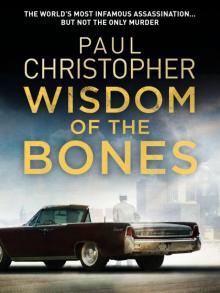 Wisdom of the Bones
Wisdom of the Bones The House of Special Purpose
The House of Special Purpose The Second Assassin
The Second Assassin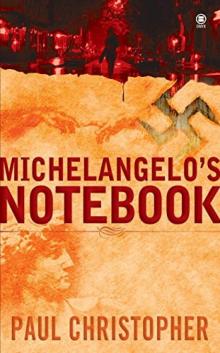 Michelangelo's Notebook
Michelangelo's Notebook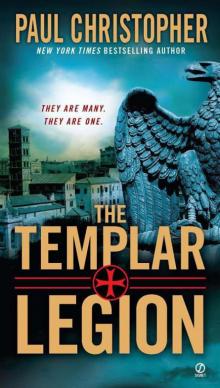 Templar Legion
Templar Legion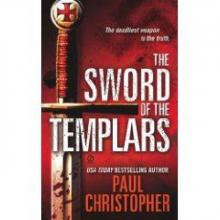 The Sword of the Templars t-1
The Sword of the Templars t-1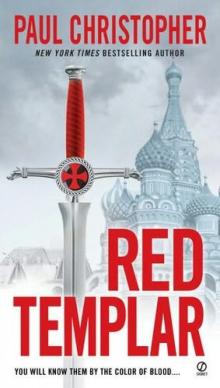 Red Templar
Red Templar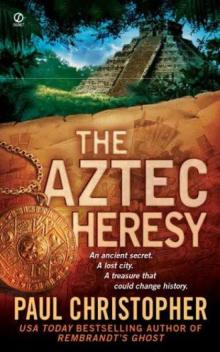 The Aztec Heresy
The Aztec Heresy The Templar Legion
The Templar Legion Rembrandt's Ghost
Rembrandt's Ghost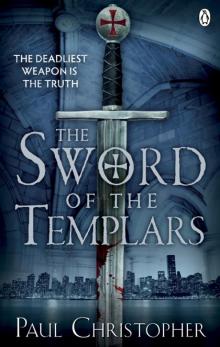 Sword of the Templars
Sword of the Templars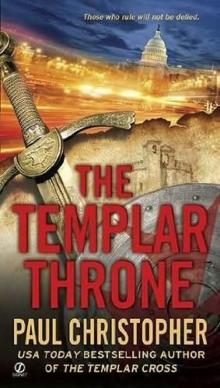 The Templar throne t-3
The Templar throne t-3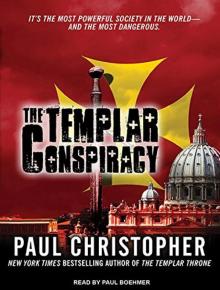 The Templar Conspiracy
The Templar Conspiracy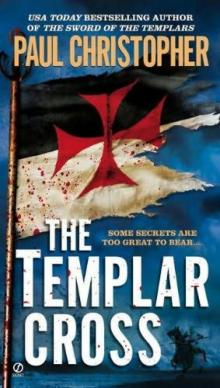 The Templar Cross t-2
The Templar Cross t-2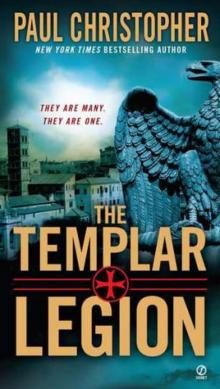 The Templar Legion t-5
The Templar Legion t-5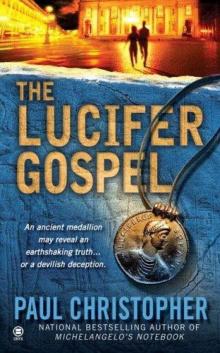 The Lucifer Gospel
The Lucifer Gospel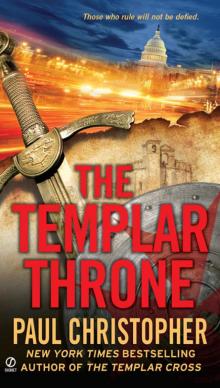 Templar Throne
Templar Throne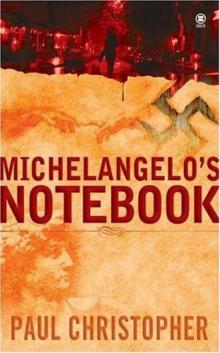 Michelangelo_s Notebook fr-1
Michelangelo_s Notebook fr-1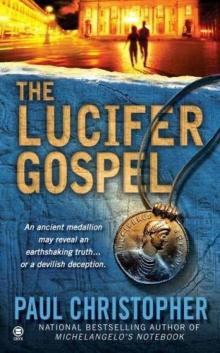 The Lucifer Gospel fr-2
The Lucifer Gospel fr-2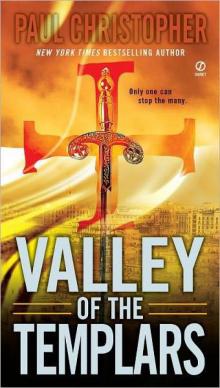 Valley of the Templars ts-7
Valley of the Templars ts-7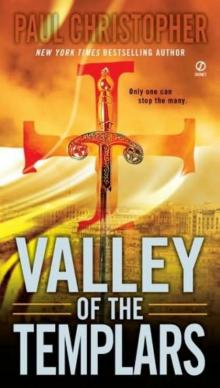 Valley of the Templars
Valley of the Templars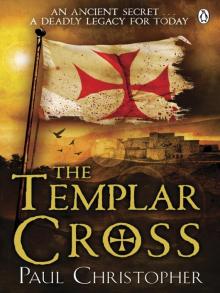 Templar Cross
Templar Cross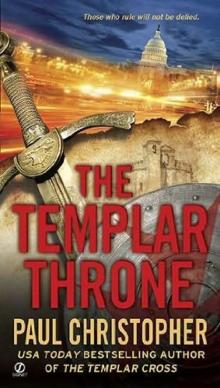 The Templar Throne
The Templar Throne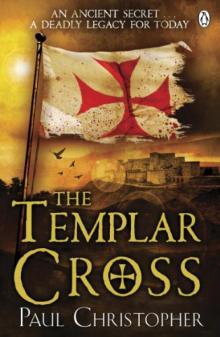 The Templar Cross
The Templar Cross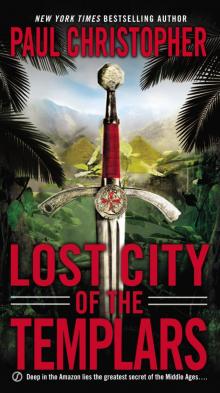 Lost City of the Templars
Lost City of the Templars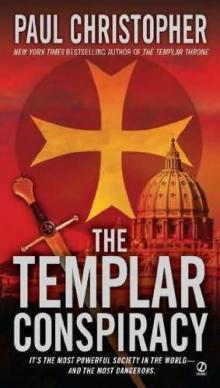 The Templar conspiracy t-4
The Templar conspiracy t-4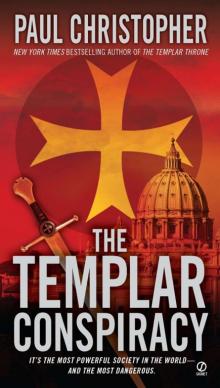 Templar Conspiracy
Templar Conspiracy